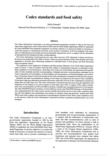Codex standards and food safety
JIRCAS international symposium series
| ISSN | 13406108 |
|---|---|
| NII recode ID (NCID) | AA1100908X |

Full text
intlsymp-11_87-93.pdf282.74 KB
The Codex Alimentarius Commission is an inter-governmental organization founded in 1962 by the Food and Agriculture Organization of the United Nations (FAQ) and the World Health Organization (WHO) to implement the Joint FAO/WHO Food Standards Programme. Its primary objective is to protect the health of consumers, to ensure fair practices in international food trade, and to promote coordination of all food standards work undertaken by international governmental and non-governmental organizations; and it is charged with the elaboration of international food standards and other recommendations.
The Codex Alimentarius Commission has met every other year since 1979, alternately in Rome and Geneva, the most recent being held in July 2001 in Geneva. There are several subsidiary bodies; those dealing with issues applicable to all foods, those elaborating standards for individual foods or food groups, and those discussing issues of regional concern.
The Agreement on the Application of Sanitary and Phytosanitary Measures of the World Trade Organization states in Article 3.1 that its members shall base their sanitary or phytosanitary measures on international standards, guidelines or recommendations, where they exist. In the case of food safety, the Agreement refers specifically to Codex standards and other recommendations. Standards and other recommendations elaborated by the Codex Committees on Food Hygiene, on Food Additives and Contaminants, on Pesticide Residues, and on Residues of Veterinary Drugs in Foods and adopted by the Codex Alimentarius Commission all fall into this category.
Standards and other recommendations relating to food safety are prepared by the relevant Codex committees following an eight-step elaboration procedure and become valid only when the Codex Alimentarius Commission adopts them as Codex final texts. The Codex Alimentarius Commission has been promoting the application and integration of risk analysis in its work in relation to food safety since 1993. In support of this, expert consultations were convened jointly by FAO and WHO to develop a scientific and conceptual framework of risk analysis. The Joint FAO/WHO Expert Committee on Food Additives and the Joint FAO/WHO Meeting on Pesticide Residues, independent from the Codex system, provide scientific and technical advice to the Codex committees dealing with food additives and contaminants, and residues of veterinary drugs and pesticides. Another joint FAO/WHO expert body conducts risk assessment of microbiological hazards in food. These expert committees serve as risk assessors, while the Codex Alimentarius Commission and those committees mentioned above act as risk managers.
The Codex Alimentarius Commission has met every other year since 1979, alternately in Rome and Geneva, the most recent being held in July 2001 in Geneva. There are several subsidiary bodies; those dealing with issues applicable to all foods, those elaborating standards for individual foods or food groups, and those discussing issues of regional concern.
The Agreement on the Application of Sanitary and Phytosanitary Measures of the World Trade Organization states in Article 3.1 that its members shall base their sanitary or phytosanitary measures on international standards, guidelines or recommendations, where they exist. In the case of food safety, the Agreement refers specifically to Codex standards and other recommendations. Standards and other recommendations elaborated by the Codex Committees on Food Hygiene, on Food Additives and Contaminants, on Pesticide Residues, and on Residues of Veterinary Drugs in Foods and adopted by the Codex Alimentarius Commission all fall into this category.
Standards and other recommendations relating to food safety are prepared by the relevant Codex committees following an eight-step elaboration procedure and become valid only when the Codex Alimentarius Commission adopts them as Codex final texts. The Codex Alimentarius Commission has been promoting the application and integration of risk analysis in its work in relation to food safety since 1993. In support of this, expert consultations were convened jointly by FAO and WHO to develop a scientific and conceptual framework of risk analysis. The Joint FAO/WHO Expert Committee on Food Additives and the Joint FAO/WHO Meeting on Pesticide Residues, independent from the Codex system, provide scientific and technical advice to the Codex committees dealing with food additives and contaminants, and residues of veterinary drugs and pesticides. Another joint FAO/WHO expert body conducts risk assessment of microbiological hazards in food. These expert committees serve as risk assessors, while the Codex Alimentarius Commission and those committees mentioned above act as risk managers.
| Creator | Yukiko Yamada |
|---|---|
| Publisher | Japan International Research Center for Agricultural Sciences |
| Available Online | |
| Issue | 11 |
| spage | 87 |
| epage | 93 |
| Language | eng |
